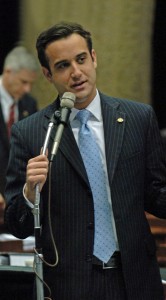By Grant Smith, RP Staff, on Thu Aug 25, 2011 at 10:00 AM ET
Steve Jobs resigns as CEO of Apple. [Bloomberg]
Texas Governor Rick Perry makes powerful bid for Republican front-runner. [Politico]
Glenn Beck speaks at the Temple Mount: no word on whether he plans to ride a donkey. [Guardian]
Former Vice-President Dick Cheney says his soon-to-be-released autobiography will have “heads exploding” in D.C. [MSNBC]
By Zack Adams, RP Staff, on Wed Aug 24, 2011 at 3:00 PM ET
Devastation in downtown Washington D.C. after yesterday’s earthquake. [picture]
How did I die exactly? [Feel Afraid]
One more dog comic. Just for laughs. [Gun Show]
Every single time. [comic]
Oh David, that little scamp. [pictures]
The Popsicle joke writers no longer seem to be trying. [picture]
By RP Nation, on Wed Aug 24, 2011 at 1:30 PM ET When I worked in Industry I was involved in rolling out a Statistical Production Control System for the department I worked in. I was very interested in being involved because, with a modest science background, I have always liked numbers. That overstates it a bit. I like good numbers, accurate numbers, numbers that can be verified. Good solid reliable numbers.
During the rollout of Statistical Production Control System I immediately ran into conflict with some of the management team. They liked charts and graphs. They wanted to see results. They especially wanted to see results that confirmed their preconceived notion of what, both, the problem and the solution was. I thought a better initial method would be to concentrate on getting the best possible data before trying to interpret what it means.
Ignoring the reliability of your input data to arrive at a pre-determined answer can only be done for one of two possible reasons, incompetence, or deception. The first reason speaks for itself and while damaging at least it is not malicious. To falsify science or analysis for your own purposes I think is especially damaging. By using the cover of reason to create perverted results for personal reasons you have not only presented false and misleading solutions but also the entire process of analysis has been badly used.
 I was reminded of this when considering what actions an individual could take to try an counter the current political climate of partisan paralysis. I have been thinking how each of us has our own unique worldview, a way that we make sense of the world around us. It is shaped by our life experiences, our faith (or lack thereof), and countless other aspects of how we receive and process information. This is what I call an Ideological Filter. It is how we decide what we agree with, what we support, and how we think the world should work. I was reminded of this when considering what actions an individual could take to try an counter the current political climate of partisan paralysis. I have been thinking how each of us has our own unique worldview, a way that we make sense of the world around us. It is shaped by our life experiences, our faith (or lack thereof), and countless other aspects of how we receive and process information. This is what I call an Ideological Filter. It is how we decide what we agree with, what we support, and how we think the world should work.
Read the rest of…
Scott Land: Ideological Filters — Their Correct Use
By RP Staff, on Wed Aug 24, 2011 at 12:00 PM ET Some 2012 candidates give out pies. Others label their speech location “the best place in the country”. All of them eat corn dogs and insist they’re not regular politicians. The cheese is getting thick in the presidential campaign.
So this week in on CNN’s “American Sauce” podcast they asked, “Can we take any of these politicians seriously?”
CNN looked to a recovering politician to answer this age-old question. Actually, The Recovering Politician.
Click here for the CNN story that features the interview with the RP.
By Stephanie Doctrow, RP Staff, on Wed Aug 24, 2011 at 10:00 AM ET The neglected and often ridiculed Los Angeles River is now open for kayaking and canoeing. Could this be a new beginning for the butt of so many L.A. jokes? [CNN]
Read one reporter’s harrowing journey alongside a prisoner in Guantanamo…and their attempt to leave. [Esquire]
Keep yourself posted on news about Hurricane Irene; emergency officials say the storm could be the first one to seriously threaten the U.S. in three years. [NY Times]
Jaleel White, also known as Urkel, is making a comeback as the stylish star of the Cee Lo music video Cry Baby. [GQ]
By Kathleen Kennedy Townsend, on Wed Aug 24, 2011 at 8:30 AM ET  America is a religious nation. Polls may differ, but most find that over 80 percent of Americans say they believe in God. Fifty percent also say they go to church on Sunday, while only half of those actually do. I guess this shows that we want to look better than we actually are, at least to the public — if not to God, who presumably knows what we’re really up to. America is a religious nation. Polls may differ, but most find that over 80 percent of Americans say they believe in God. Fifty percent also say they go to church on Sunday, while only half of those actually do. I guess this shows that we want to look better than we actually are, at least to the public — if not to God, who presumably knows what we’re really up to.
Most political candidates also profess their belief in God. At the same time, they rarely make a big deal of their devotion. They’ve probably read Matthew 6:1, which warns, “Beware of practicing your piety before men in order to be seen by them.”
 Texas Gov. Rick Perry, who just announced he’s running for president, has taken a different tack. A week before announcing his candidacy, he led a prayer meeting for evangelical Christians in Houston. The Freedom From Religion Foundation filed a lawsuit trying to stop him from participating in this rally, arguing that he was violating the First Amendment by using his position, stationery, and website to promote the event. The court dismissed the complaint, saying that the plaintiff didn’t show sufficient harm to merit the injunction. Texas Gov. Rick Perry, who just announced he’s running for president, has taken a different tack. A week before announcing his candidacy, he led a prayer meeting for evangelical Christians in Houston. The Freedom From Religion Foundation filed a lawsuit trying to stop him from participating in this rally, arguing that he was violating the First Amendment by using his position, stationery, and website to promote the event. The court dismissed the complaint, saying that the plaintiff didn’t show sufficient harm to merit the injunction.
I disagree with the court’s ruling. I think the governor misused his office to promote a particular religion. That might have been clearer to the judge if Perry had organized a rally in support of Islam rather than Christianity. There’s no difference as far as the First Amendment is concerned.
Read the rest of…
Kathleen Kennedy Townsend: Is Rick Perry as Christian as He Says He Is?
By Stephanie Doctrow, RP Staff, on Tue Aug 23, 2011 at 1:30 PM ET One presidential candidate who isn’t getting as much media attention as the rest: Ron Paul. [Politico]
Jann Wenner, the founder of Rolling Stone and the owner of US Weekly and Men’s Journal, is getting a divorce. Could a divorce settlement be the end of the Wenner media empire? [NY Magazine]
Here’s a list of the top magazines you’re likely to find in doctors’ offices and hair salons. The results might surprise you. [Ad Age]
Writer David Foster Wallace’s colloquial writing could be said to be the first voice of the Internet age. [NY Times]
Try some amateur reporting with Storyful, a website that allows you link tweets, videos and images to tell a story. [Storyful]
By RP Nation, on Tue Aug 23, 2011 at 12:00 PM ET Most would agree that “economic growth” is essential to our recovery. And implicit is the notion that without growth we will not significantly create jobs and reduce unemployment.
First let’s look at the most commonly proposed answer to our twin deficits.
- Cut taxes. Let’s get serious. Cutting taxes on the income of the rich just isn’t going to happen and even if it did opinion is divided is to whether it is effective at stimulating growth. (Pretend you’re a multi-millionaire and you receive an increase in income from reduced taxes. Would you buy more stock on the market or make a job producing investment?) And if we cut taxes on the lower income brackets, conventional wisdom says the propensity to spend the resulting income is much higher than for the wealthy. Such spending however may be most likely to wind up being spent at Walmart, Sam’s, Kohl’s, Costco, and Macy’s. End result? Buying more goods manufactured in China, India or Mexico with a commensurate increase in the deficit in our balance of payments. Tax cutting will only be productive if it results in channeling the increased taxpayer disposable income into channels that create jobs and stimulate growth!
- Historically, the saying was: “what’s good for General Motors is good for the country” or as “home building goes, so goes the nation”. The reason behind such platitudes was valid. For each dollar spent in both industries, there is a great multiplier effect from increased employment not only of the basic industries but from the myriad of suppliers. However, today, the TARP (troubled asset relief program) program has already done it’s thing for the auto industry. And, stimulating homebuilding today is impossible as long as the overhang exists of the huge inventory of unsold houses including those in foreclosure.
Thus what we need is a new approach and here it is:
I. Put the construction industry back to work by a nationwide new construction program to house the homeless.
II. Tens of thousands of bricklayers, electricians, contractors, welders, framers go back to work. And as a direct result, so to will growth be restored to appliance manufacturers, wall paper manufacturers, and such manufacturers of related ingredients as wiring, faucets, fireplaces, paint, fertilizer, nurseries ad infinitum. Unemployment roles will be reduced, tax revenues increased and growth restored.
III. But from whence commeth the money to fund this enormous program of land acquisition and construction? From two sources (to be mandated by legislation): philanthropic organizations and from pension profit sharing, IRA’s, and other tax exempt retirement plans.
IV. But how do these plans recoup their investment and earn a return on their investment. After a period three years, each homeless project will be converted to Section 8 Housing for the elderly and handicapped. This is a Housing and Urban Development Program for Elderly and Handicapped for low income people. Under the program the Tenants pay essentially 30% of their income (usually just social security income) as rent and HUD subsidizes the balance of the rent to bring such rent to “fair market rent” for the locality in which each project is located. The organization for the HUD program is already in place, is exceedingly organized and administered (though not without potential for improvement). The shortage of available housing for the elderly and handicapped is enormous and there are long waiting lists for housing among eligible people. But, most important, well managed projects make a reasonable return on investment for their owners and have potential to increase in value. Moreover, the aging of the US population is well known and indisputable: thus the ongoing need for increasing the available supple of suitable housing is incontrovertible.
V. Finally, rules would have to be established that would required construction standards to be followed that will ease the eventual conversion of each project from “Housing for the Homeless” to “Housing for the Elderly and Handicapped.”
Summary: Thus in one simple to understand plan is at least a partial solution to not just one but several urgent national problems: (a) restoring growth to the economy, (b) reducing unemployment, (c) providing living with dignity accommodations to the homeless, and (d) providing reasonable and necessary housing to our aging populace and disabled citizens. Updates to this proposal may be found at the author’s website: https://sites.google.com/site/wealthcreationretention/home
By Kristen Hamilton, RP Staff, on Tue Aug 23, 2011 at 10:00 AM ET
Have you ever heard of a mankini before? What about jeggings? Have no fear! You can now find them in the Oxford dictionary! [Glamour]
Have you heard? Sex and the City 3 could be coming to a theater near you! [MSNBC]
In what was deemed our own ‘royal wedding,’ Kim Kardashian wedded Kris Humphries this past weekend. Check out the first pics of her gown: [US Magazine]
Say what? There is a new fashion capital! Check out what city took the top spot: [Glamour]
By Jason Grill, on Tue Aug 23, 2011 at 8:30 AM ET  1. Fix the political redistricting system once and for all – States across this nation are currently going through the process of redrawing State Representative and State Senate lines. In the end members from both parties and appointed party loyalists will not be able to agree on a map and the court system will be prompted to step in. This process takes place every ten years and is truly outdated and way too political. Why not save time and take the human element out of the process? In an age where people do almost everything electronically why are nonpartisan computers not setting these lines? Start the new process with a checkerboard pattern covering the whole state. Then the computer will adjust the squares based on population so every Representative and Senator represents the same amount of people. A grid with large and small squares that has nothing to do with which neighborhood has nicer houses, who votes the most, where a golf course is located, or what school district is where will decide rational districts once and for all. It is an absolute joke and truly unfair to the citizens of this nation for political gerrymandering to continue to go on in 2011. How great would you feel at the start of an election cycle if whether you would have a Republican, Democrat, or Independent elected official was not in a sense predetermined? Leave this up to computers and not partisan individuals who are protecting themselves and their party when drawing geographically ridiculous political district lines. Isn’t this about fair democratic representation? Instead of backroom bickering and fighting over half of a small suburban neighborhood or which urban corridor is more important, we should be asking is there an app for that! 1. Fix the political redistricting system once and for all – States across this nation are currently going through the process of redrawing State Representative and State Senate lines. In the end members from both parties and appointed party loyalists will not be able to agree on a map and the court system will be prompted to step in. This process takes place every ten years and is truly outdated and way too political. Why not save time and take the human element out of the process? In an age where people do almost everything electronically why are nonpartisan computers not setting these lines? Start the new process with a checkerboard pattern covering the whole state. Then the computer will adjust the squares based on population so every Representative and Senator represents the same amount of people. A grid with large and small squares that has nothing to do with which neighborhood has nicer houses, who votes the most, where a golf course is located, or what school district is where will decide rational districts once and for all. It is an absolute joke and truly unfair to the citizens of this nation for political gerrymandering to continue to go on in 2011. How great would you feel at the start of an election cycle if whether you would have a Republican, Democrat, or Independent elected official was not in a sense predetermined? Leave this up to computers and not partisan individuals who are protecting themselves and their party when drawing geographically ridiculous political district lines. Isn’t this about fair democratic representation? Instead of backroom bickering and fighting over half of a small suburban neighborhood or which urban corridor is more important, we should be asking is there an app for that!
2. Blanket primaries – Shouldn’t the goal of any election to be to elect the best candidate regardless of political party or persuasion? Some states have already implemented top-two, non-partisan blanket primaries with success. The city of Kansas City, Missouri currently does this with its Mayoral election. Just last winter this system resulted in the two most qualified candidates for the job reaching the general election. Basically, this election method puts all candidates, regardless of party affiliation, on the same ballot in the primary. The top two voters then face off in a general election to be held usually in the next one to three months after the primary election. I can’t count the number of times Republicans came up to me and said they were sorry they couldn’t vote for me because I wasn’t on their primary ballot. This system would also stop candidates from running so far to the right or left to win the votes of party primary voters. We all know voter turnout is low in primaries. Most Americans are sick of voting for extreme candidate 1 or extreme candidate 2 in general elections. They want common sense solutions and are tired of partisan rhetoric. It doesn’t have to be a nonpartisan election; candidates can voice their party affiliation, but why not just have the two best candidates face off in the general election based on the issues of the day and ideas. Blanket primaries will solve many of our general election malaise.
 3. Get rid of term limits – Many states and voters have implemented term limits for elected officials such as legislators. In Missouri, State Representatives can serve four two-year terms and State Senators can serve two four-year terms. The reasoning, legislators become fat and happy, become too close to lobbyists, and run out of creative ideas and motivation. The problem is that just the opposite has happened. Legislators are running for reelection before they even find the bathroom in the capitol, they are forced to think about their next elected position they will run for up the ladder, lobbyists begin to have more influence on the process because there are so many new people every two years, and legislators are so wet behind the ears they have no idea how to effectively legislate. Would you tell your family doctor or specialist that you could only see them for a limited amount of time even though they are great at what they do? Would you tell an amazing teacher that after 8 years they could no longer teach in your community? Would you tell a successful small business owner, sorry buddy I have to shut down your incredible entrepreneurial endeavor? Lastly, would you tell a world-class athlete that they could no longer dominate a sport and bring a smile to a fan’s face because they can only play for awhile? I want the best people running and holding political office. For some reason I think you would agree. Elections are held every few years where people can elect or vote individuals out of office. We saw a Republican “Tea Party” tidal wave in 2010 where many incumbents were voted out of office. The pendulum could and probably will swing back and many of these same individuals will be put back into elected office in 2012, 2014, or sometime down the road. This is the great thing about the process; we don’t need arbitrary numbers of years to police the system. I want the best people running my community, my state, and my country. If someone is doing a good job or excelling at their job let them face the voters not time. 3. Get rid of term limits – Many states and voters have implemented term limits for elected officials such as legislators. In Missouri, State Representatives can serve four two-year terms and State Senators can serve two four-year terms. The reasoning, legislators become fat and happy, become too close to lobbyists, and run out of creative ideas and motivation. The problem is that just the opposite has happened. Legislators are running for reelection before they even find the bathroom in the capitol, they are forced to think about their next elected position they will run for up the ladder, lobbyists begin to have more influence on the process because there are so many new people every two years, and legislators are so wet behind the ears they have no idea how to effectively legislate. Would you tell your family doctor or specialist that you could only see them for a limited amount of time even though they are great at what they do? Would you tell an amazing teacher that after 8 years they could no longer teach in your community? Would you tell a successful small business owner, sorry buddy I have to shut down your incredible entrepreneurial endeavor? Lastly, would you tell a world-class athlete that they could no longer dominate a sport and bring a smile to a fan’s face because they can only play for awhile? I want the best people running and holding political office. For some reason I think you would agree. Elections are held every few years where people can elect or vote individuals out of office. We saw a Republican “Tea Party” tidal wave in 2010 where many incumbents were voted out of office. The pendulum could and probably will swing back and many of these same individuals will be put back into elected office in 2012, 2014, or sometime down the road. This is the great thing about the process; we don’t need arbitrary numbers of years to police the system. I want the best people running my community, my state, and my country. If someone is doing a good job or excelling at their job let them face the voters not time.
Read the rest of…
Jason Grill: Five & a Half Steps to Fix American Politics
|
The Recovering Politician Bookstore
|













